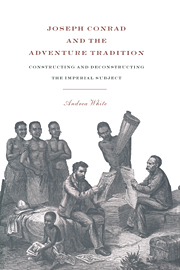Book contents
- Frontmatter
- Contents
- Acknowledgments
- Introduction
- 1 Constructing the imperial subject: nineteenth-century travel writing
- 2 Adventure fiction: a special case
- 3 Them and us: a useful and appealing fiction
- 4 The shift toward subversion: the case of H. Rider Haggard
- 5 Travel writing and adventure fiction as shaping discourses for Conrad
- 6 Almayer's Folly
- 7 An Outcast of the Islands
- 8 The African fictions (I): “An Outpost of Progress”
- 9 The African fictions (II): “Heart of Darkness”
- Coda
- Notes
- Bibliography
- Index
5 - Travel writing and adventure fiction as shaping discourses for Conrad
Published online by Cambridge University Press: 10 December 2009
- Frontmatter
- Contents
- Acknowledgments
- Introduction
- 1 Constructing the imperial subject: nineteenth-century travel writing
- 2 Adventure fiction: a special case
- 3 Them and us: a useful and appealing fiction
- 4 The shift toward subversion: the case of H. Rider Haggard
- 5 Travel writing and adventure fiction as shaping discourses for Conrad
- 6 Almayer's Folly
- 7 An Outcast of the Islands
- 8 The African fictions (I): “An Outpost of Progress”
- 9 The African fictions (II): “Heart of Darkness”
- Coda
- Notes
- Bibliography
- Index
Summary
The author who often spoke disparagingly of “boys' adventure tales” had probably consumed his share by the time he ran off to sea, as countless boys before him in the pages of adventure fiction had done. From what he and others have written about his early reading, the sea stories of Hugo, of Marryat and of Cooper shaped many of his youthful imaginings, and Jacob Faithful, Masterman Ready, and Peter Simple must have been well known to Conrad from an early age as prototypes of heroic action. In “Tales of the Sea,” a laudatory review of the works of Marryat and Cooper he wrote in 1898 for the Outlook, there was only the congratulatory in his description of Marryat's formula: “to his young heroes the beginning of life is a splendid and warlike lark, ending at last in inheritance and marriage.” He admitted here to having been “enslaved,” not only by the formulaic heroes, but also by the idealizing power of the work – both characteristics of adventure fiction – by Marryat's power to depict “the spirit animating the stirring time when the nineteenth century was young.” To lose it, he claimed, would be “like the curtailment of national story or the loss of a historical document.” He spoke of Marryat as a kind of irrational force, when he described that writer's “irresistible power to reach the adventurous side of the character” and of his power to “enslave,” a power to which Conrad had to “surrender.”
- Type
- Chapter
- Information
- Joseph Conrad and the Adventure Tradition , pp. 100 - 115Publisher: Cambridge University PressPrint publication year: 1993
- 1
- Cited by



